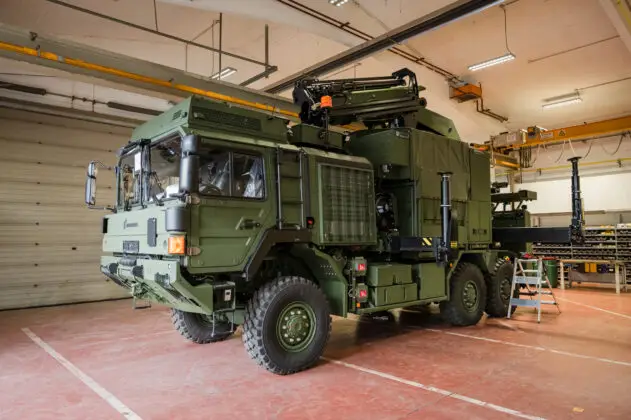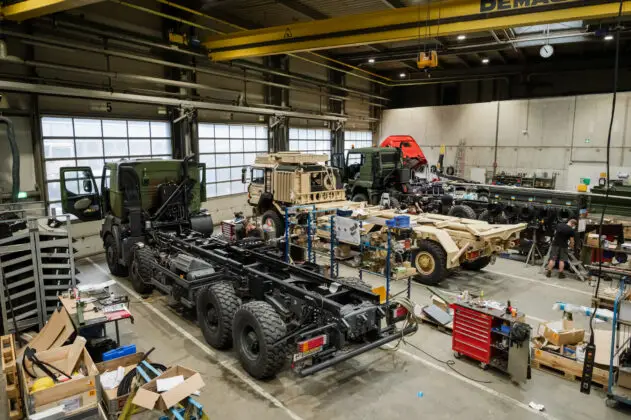Herbert Empl developed the Tyrolean vehicle body builder Empl (-> Company portrait: Built onto the truck chassis) to international stature. As Deputy President of the Working Group for Safety & Economy in the Austrian Federal Economic Chamber, he is now working to ensure that other red-white-red companies follow similar paths to success.
Mr. Empl, your company supplies armed forces and armies worldwide. When you come into contact with industry representatives from other countries, how do they view Austria? What do they associate with “Made in Austria”?
The reaction is always very positive. People associate Austria with hospitality, beautiful nature and culture. But also reliability, flexibility, quality and high-quality products. That helps when starting a conversation. However, if you want to successfully cultivate a market, you need more than just this advance praise.
Namely?
The acceptance of the customer.
And how do you get them?
By delivering high-quality products and meeting deadlines. But also by showing a presence in the customer’s country, being available for discussions on site and not shying away from creative solutions. The large manufacturers in other countries may be able to supply larger quantities and have more products on offer. But they usually only offer off-the-shelf products. The Austrian industry, on the other hand, provides customers with high-quality and precisely customized individual solutions.

What exactly is “Austrian industry”? Empl now has more than 600 employees and, in addition to its main plant in the Tyrolean Zillertal, also produces near the German city of Leipzig. How representative is your company of the Austrian security and defense industry?
We have a few major players in Austria such as Rheinmetall MAN Military Vehicles, Frequentis and Pandur manufacturer General Dynamics European Land Systems-Steyr in Vienna, Steyr Arms or Glock. The rest is much smaller in scale, although our companies always impress with high-quality products, even in the high-tech sector. We are world market leaders in many areas. I also see Empl in a very good and strong position. We have been supplying from Brazil to South East Asia, from Norway to Africa and, of course, to the German armed forces and the Austrian Armed Forces.
In view of the budget shortage in recent decades, the number of units in the armed forces must have been manageable, right?
Of course, these were never the really big orders, but they were always smaller orders, which usually required vehicles that could cover several applications at once. Being able to deliver this is often a challenge at first, but at the end of the day it benefits us today.
In what way?
For a long time, the Austrian Armed Forces could not afford to buy their own vehicles for every purpose like other armies. The few vehicles that could be procured were of high quality and well equipped, but usually had to cover several tasks. Flexibility was a top priority. In order to meet customer requirements, we successfully adapted our products and soon realized that multifunctionality was also in demand in other markets.

So the adjustments are a recipe for success?
Yes, in many markets. The swap bodies developed for the Austrian Armed Forces, for example, are in demand worldwide. In the case of a fire-fighting container recently built for the armed forces (-> Empl supplies extinguishing containers to the army) is similar – the Slovenian army has now also opted for it (-> Five water tank flats for Slovenia). And we are even exporting our automatic leveling system, which uses sensors to quickly and variably adapt the vehicle to a wide range of terrain conditions, to France, even though the French are not exactly known for awarding contracts abroad. Similar examples can also be found at many other Austrian companies. They are masters at adapting products to customer requirements, developing special solutions and thus being successful on the market.
We have now talked a lot about the vehicle and mobility sector. Apart from that, do you see any other areas of strength for the red-white-red industry?
There are a few. As already mentioned, the production of small arms is certainly a strong area, there are also important players in the aerospace sector and in future I also see good opportunities for our companies in a broader maintenance and service offering.
“People associate Austria with hospitality, beautiful nature and culture. But also reliability, flexibility
and quality.”Empl-Seniorchef Herbert Empl
Do you mean the maintenance and servicing of equipment and vehicles?
Yes, but also infrastructure. Many armies are currently struggling with personnel problems, there is a shortage of soldiers – but also of maintenance and repair staff. That’s a problem, because it’s not just a matter of changing the oil in a vehicle every now and then. The issue is much more complex, and even if I have no current use for a system, I still have to move, test and maintain it regularly – no vehicle has ever gotten better from standing around. Investing a lot of money in buying the vehicles first and then not maintaining them properly afterwards can’t be the solution either.
Do you see any other interesting future potential and markets for Austrian industry?
We clearly have strengths in the supply sector – but we need to translate these even more into concrete business. For example, we at Empl supply Kongsberg with a wide range of products, from hook loaders to the Puch G, with the corresponding equipment and fittings. Or Diehl DefenseThe company plays a major role in the European Sky Shield Initiative (ESSI) and we supply the superstructures. And there are also good opportunities for other domestic companies to participate in major projects in a similar way – or with completely different approaches. Achleitner (-> Company portrait: Special protection vehicles “Made in Tirol”), for example, recently entered into a cooperation with the Dutch manufacturer Defenture in the Netherlands. The company supplies GRF vehicles to the Austrian Armed Forces Hunting Command, with Achleitner taking on system integration as well as lifelong service support, thereby building up expertise that could potentially be of interest to other companies in the future. To what extent does the Security & Economy Working Group (ASW) of the Chamber of Commerce, of which you are Deputy President, promote and support the efforts of companies?
On several levels: On the one hand, the ASW acts as an intermediary between industry and the armed forces, with the aim of informing companies about the procurement plans at
Heer and showing them what the national industry can cover. On the other hand, the ASW also builds international bridges for its member companies, for example by promoting and supporting trade fair appearances. Or by sharing information about developments in individual markets, providing contacts and also bringing international companies into contact with domestic companies. https://militaeraktuell.at/black-hawk-produktionsauftrag-fuer-sikorsky/
Following Russia’s invasion of Ukraine(-> Current news from the Ukraine war), many European countries have raised their defense budgets, in some cases significantly, and decided to increase them. Has this “turning point” already reached the industry?
Most European countries have woken up since the beginning of the war in Ukraine and now at the latest after the outbreak of war in the Middle East. They have realized that they need to do more for their security. And as you rightly say, this is also reflected in higher defense budgets. And yes, we are also benefiting from this – not least because we are investing heavily in the armed forces. The bottom line is that we have a higher order backlog than ever before in our company’s history.
Empl likes to advertise with “Made in Austria”. To what extent are the purchased components, assemblies and products also manufactured in Austria?
Fortunately, we have a structure of small and medium-sized suppliers that has grown over decades, on which we can rely and which supply high-quality products for a wide variety of areas. For our superstructures, for example, the national value added – depending on the specific product – is at least 60 percent, in some cases even 90 to 95 percent. So where it says “Made in Austria”, we always put “Made in Austria” inside.
Click here for further news from Empl.
















